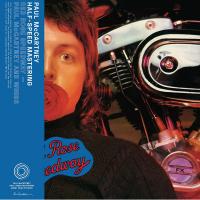Great review, Mark. I, too, have suffered through those murky pressings of RRS, so I’m in for this half-speed from Miles. I have a lot of them...almost every one a winner.
Paul McCartney and Wings’ Red Rose Speedway Finally Gets Its Due on Vinyl, Thanks to a Half-Speed-Mastered 180g 1LP Release on Record Store Day 2023
Beatles fans generally fall into two camps when it comes to how they feel about Paul McCartney’s solo and Wings eras — they either love them, or they more or less loathe them. However, there are those like me who fall into a midway camp for various reasons.
I’ll go on record saying I love the first McCartney solo album, April 1970’s McCartney, in all its raw, innocent beauty. And the follow-up release, May 1971’s Ram (credited to Paul and Linda McCartney) is arguably the finest post-Beatles solo production.
However, Sir Paul’s output with Wings has always flustered me. I’ve certainly grown to appreciate December 1971’s Wild Life for all its proto-indie-rock production aesthetic and Smiley Smile-like quirkiness. December 1973’s Band on the Run is an album I have always wanted to love more than I do, in part because of fidelity issues in the past, not to mention the production quirks that always left me a little bit flat, and in some places actually disappointed — especially the out-of-tune parts. (BOTR sidenote: The former issue has been addressed in many ways, given the remasters from several years back. The white vinyl pressing in particular, which a Beatlefan friend hepped me to, sounds especially good.) In contrast, May 1975’s Venus and Mars was in some ways almost too slick, production-wise, but it does have some great tunes on it and overall is a great album.
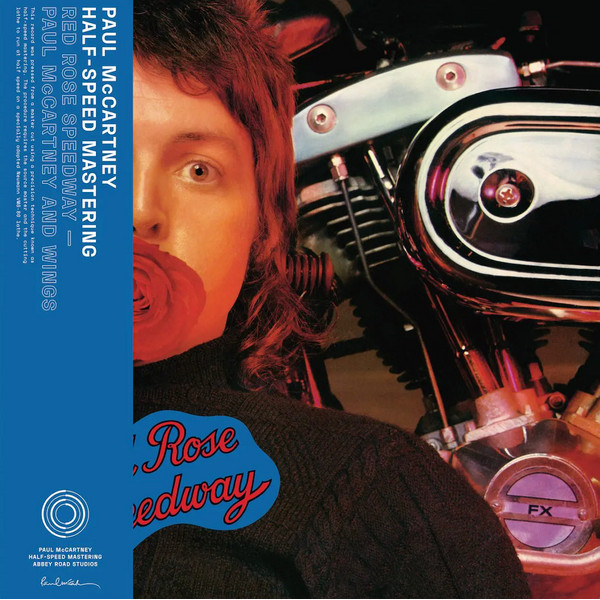
All that said, the one Wings album I’ve really grown to love over the years is April 1973’s Red Rose Speedway. This album feels like the logical successor to Ram, and as I’ve explored different pressings — and several CD incarnations — along the way, it’s always hinted there might be something sonically stronger hidden within the grooves.
According to McCartney’s official site, “The first Paul McCartney and Wings album to top the US album chart, Red Rose Speedway kicked off a run of #1 albums that included Band on the Run, Venus and Mars, At the Speed of Sound, and Wings Over America. The album’s sole single, ‘My Love,’ was received with similar warmth, becoming Wings’ first #1 single in the U.S., as well as a staple of Wings and Paul shows for decades to come.”
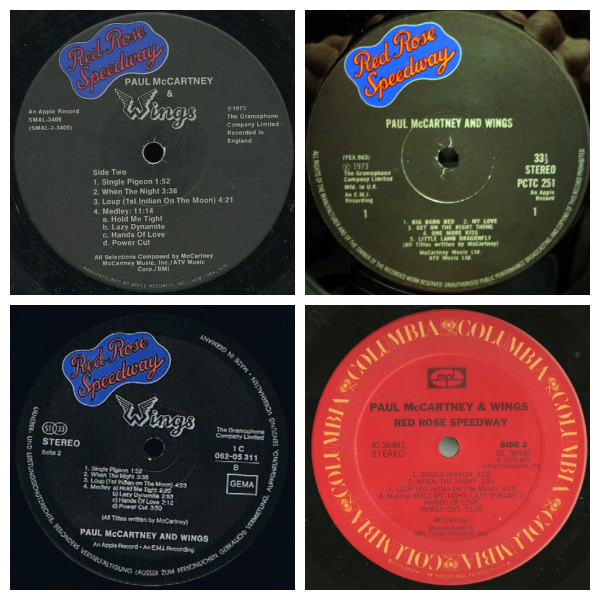
Over the years, I’ve had several American pressings of Red Rose Speedway, including one of the Columbia-era editions that sounded pretty good, actually. More recently, I found a quite nice 1970s-era German pressing that enabled me to purge my U.S. Apple Records copy, which always sounded muddy to my ear.
In advance of listening to the new, half-speed-mastered 50th anniversary edition of Red Rose Speedway that came out on Record Store Day 2023, April 22 (which we previewed here) — and trying to keep my perspective in something of an apples-to-apples perspective (so to speak) — I re-listened to that ’70s German pressing. Yes, it sounded pretty good — but again, I couldn’t help but feel it was overly compressed and ultimately a bit mushy. Was it that the mix that was bad, or was it just the sonic imprint of the mastering style of the times? Well, with this new RSD 2023 edition of Red Rose Speedway, I think I have found the answer — at least in part!
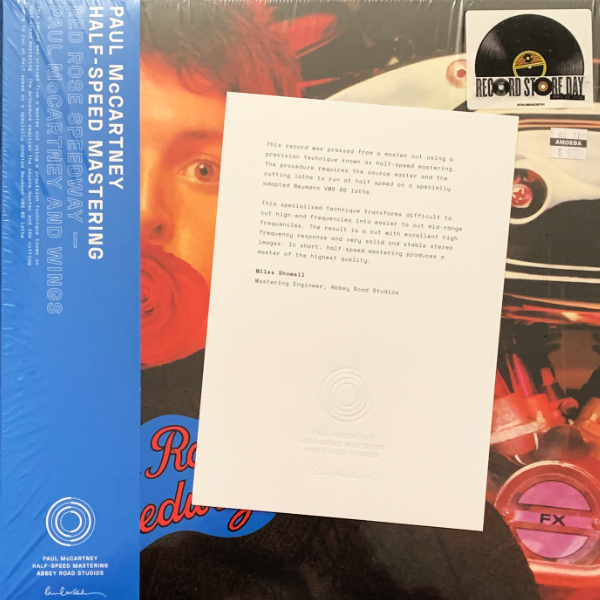
Before we get into all that, let’s first lay down all the key production stats we know of at this time on this fine new release. As noted above, the 50th anniversary edition of Paul McCartney and Wings’ Red Rose Speedway was released on RSD 2023, billed as being an “RSD First” run of 5,000 copies. The SRP has tended to vary, with it going for around $40 on RSD 2023, though we’ve since seen it offered online for up to $65 (at least as of this posting).
Red Rose Speedway was half-speed mastered at Abbey Road Studios in London by acclaimed audio engineer Miles Showell. The new 1LP edition is pressed on thick, dark, and well-centered 180g black vinyl, manufactured in the Czech Republic and pressed at GZ. This edition nicely reproduces the original album art, including the booklet insert — they even recreate period-accurate labels to mirror the original UK edition, meaning there is no groovy Wings logo on it like in the U.S. and Germany.
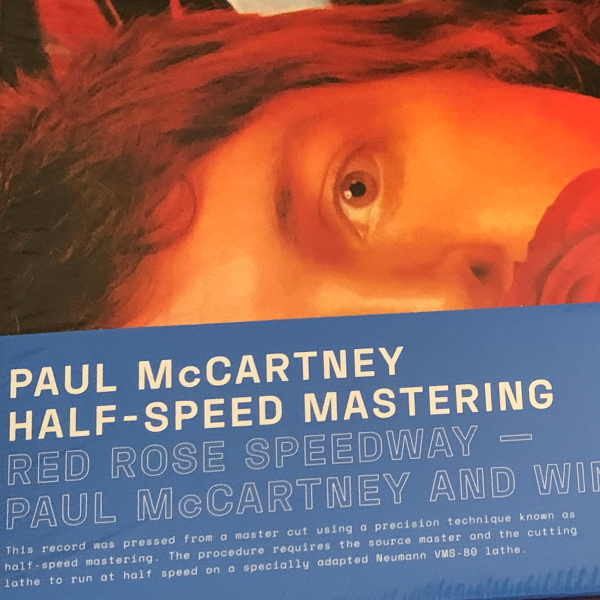
The original Red Rose Speedway album was produced by Paul McCartney with assistance on one track from George Martin, and there were multiple engineers involved, including Alan Parsons and Glyn Johns. Regarding the half-speed mastering, there are some important production details curiously tucked away in the very teensy-tiny ultra-fine print at the bottom of the otherwise all-white thick paper inner sleeve — to wit: “Vinyl cut by Miles Showell at half speed using a high-resolution transfer of the original 1973 master tapes at Abbey Road Studios, London. This half-speed master closely references the 2018 remaster by Alex Wharton and Steve Orchard. It was made as a vinyl specific transfer in high resolution and without digital peak limiting for the best possible reproduction.”
That latter detail — “without digital peak limiting” — helps explain at least in part some of what I am hearing on this excellent new edition. As I understand from spot-checking the concept (I’m not an audio engineer, though I have produced albums and recorded in professional studios with my old band), this sort of automated technology was a preventative process to minimize volume overloads and distortion. You’ve probably heard, or at least heard about, numerous modern digital productions that have been brickwalled by too much compression, resulting in a wonky-sounding and un-dynamic final recording. It stands to reason that perhaps there was just a bit too much limiting going on back in the early ’70s for numerous reasons such as manufacturing and playback concerns, radio broadcast considerations, and the like.
Whatever the reason — that was then, and this is now. And now that we know this version of Red Rose Speedway is purported to have zero limiting, that would appear to imply we are hearing the music on this LP much closer to how Sir Paul, Miles Showell, and others have heard it in the studio.
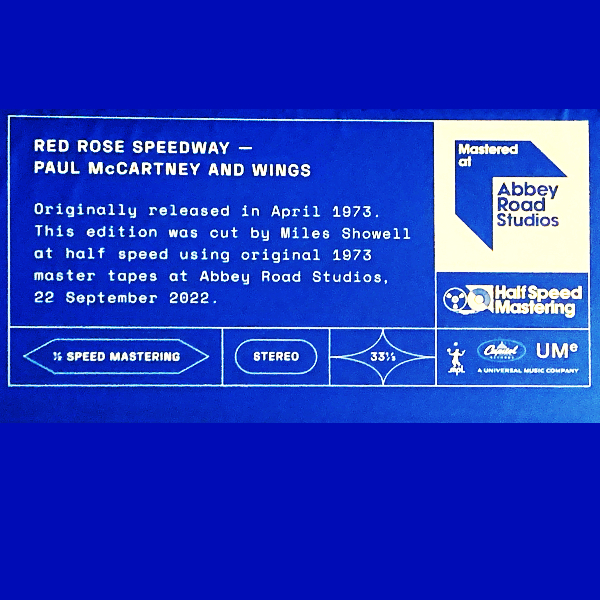
Indeed, I’m hearing a sense of air and dynamics in this RSD 2023 version that I’ve not really heard before (even on my pretty crisp CDs). The instrumentation appears not just brighter, but more vibrant and alive. I’m now noticing loads of details instrumentally that were effectively buried in prior editions. For example, listen for the electric guitar stabs that come on one channel in the Side 1 opening track, “Big Barn Bed.” While those stabs are there on the original and feel like they’ve got a blanket over them, on the new version, they kind of slap you in the face — and I mean that in the best possible way.
While I don’t own that earlier-referenced 2018 remaster, I have cherrypicked some tracks from the 24-bit/96kHz version on Qobuz that sound pretty great — for the record, they were decoded through a Mytek Brooklyn DAC — but I’m not feeling that same sense of studio presence like I do on the half-speed-master LP. The start of “Big Barn Bed” is a good moment to explore for a quick comparison/contrast. A very ripping, overdriven electric guitar is punching out rhythms there, and it sounds really very good, all things considered. But on this new half-speed-mastered Red Rose Speedway LP, you can feel the raw sound of that guitar amp resonating during the feedback burst. Meanwhile, the acoustic guitar in the other channel has much more ambiance, and a lifelike presence about it. Turn it up loud, and “Big Barn Bed” just rocks so very hard now. It’s terrific!
The acoustic guitars on tracks like “Little Lamb Dragonfly” at the end of Side 1 sound positively gorgeous. I am now getting to hear the soft “Long and Winding Road”-like piano touches in that song, which feel so present in the room. I feel almost like I’m hearing a studio outtake here — and yes, those soft touches are also there in the original, but they’re more hushed. I am also noticing clarinet flourishes cutting through for the first time amidst the orchestral sections later in the song.
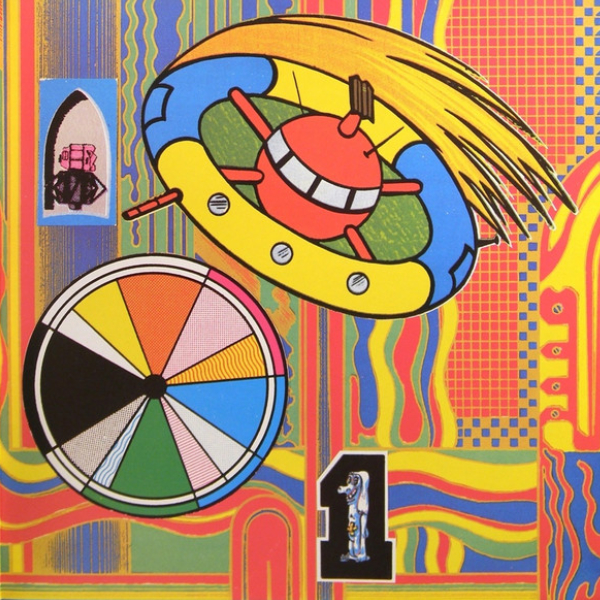
The piano on the Side 2 opener "Single Pigeon" also sounds rich and natural. McCartney’s voice is light and airy, and I’m hearing more detailing of the harmonies they layered up in the studio.
Again, it’s worth noting earlier vinyl pressings of Red Rose Speedway have generally sounded constrained, as if somebody was cutting back on the dynamics in fear of it being too sonically challenging for the average turntable of the day — something that might well have been the case, since those kinds of considerations were made at times back in the ’70s. (For an example of what I am talking about here, do an interwebs search of “Led Zeppelin II, Robert Ludwig mix.”)
Another detail possibly in play impacting the fidelity of the original pressings may simply be the quality of the vinyl. One of the Middle Eastern oil crises was happening around the time this album was released, so there were increasingly strong measures to conserve oil (a key ingredient in making vinyl). By the time I was actively collecting records in the mid/late ’70s, vinyl quality was indeed suffering on new albums, and this factor is actually one of the reasons I started seeking out — instinctively — more original pressings of the vintage albums from the 1950s and ’60s I was interested in at that time, as I found they sounded better than the reissues. While I don’t know it for sure, it is arguably possible that sonics might have been compromised due to this vinyl-quality issue.
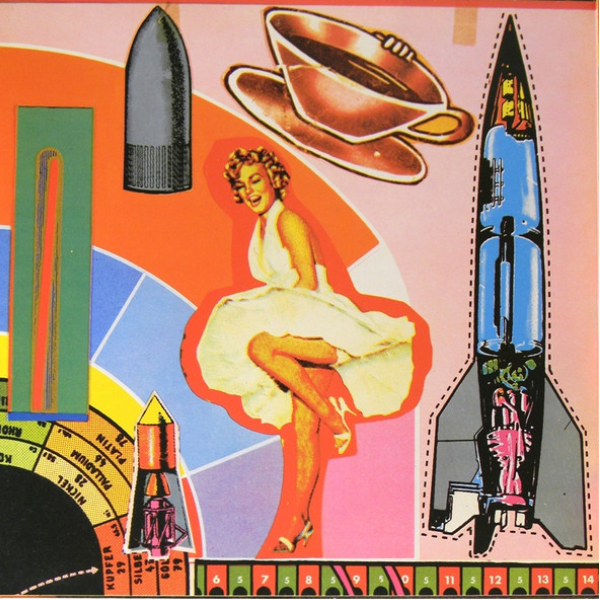
There is only one glitch I do have to report on here, however — my first copy of this new Red Rose Speedway LP did have some pressing issues, including what sounded like non-fill distortion at the start of both sides. Fortunately, I was able to exchange it for a new copy that doesn’t have those issues, so hopefully my initial copy was a one-off anomaly.
The bottom line is, this new Miles Showell half-speed-mastered edition of Paul McCartney and Wings’ Red Rose Speedway is a night-and-day listening experience — and, for that, I’m eternally thankful. If you didn’t pick up a copy of this LP on RSD 2023, I would strongly suggest checking around sooner than later to find one of your own.
(Mark Smotroff is an avid vinyl collector who has also worked in marketing communications for decades. He has reviewed music for AudiophileReview.com, among others, and you can see more of his impressive C.V. at LinkedIn.)

PAUL McCARTNEY AND WINGS
RED ROSE SPEEDWAY
180g 1LP (MPL/Capitol)
Side 1
1. Big Barn Bed
2. My Love
3. Get On The Right Thing
4. One More Kiss
5. Little Lamb Dragonfly
Side 2
1. Single Pigeon
2. When The Night
3. Loup (1st Indian On The Moon)
4. Medley:
a. Hold Me Tight
b. Lazy Dynamite
c. Hands Of Love
d. Power Cut
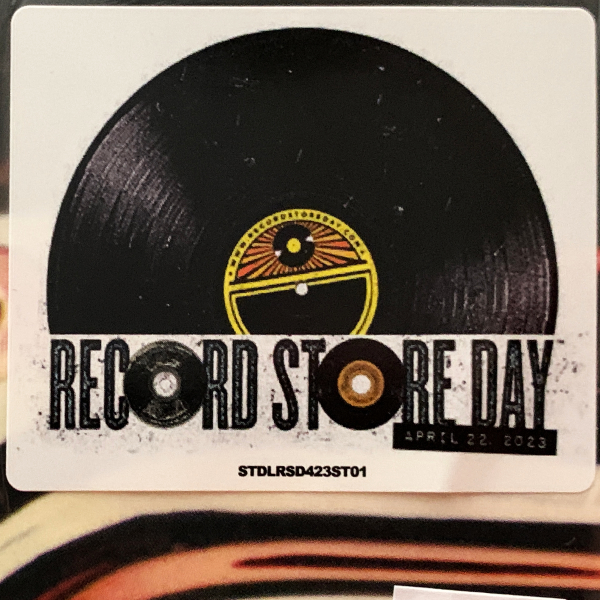
- Log in or register to post comments

Thanks for the kind words. Indeed, Miles' work has generally been excellent!

Thanks! I share the general skepticism around solo Paul, but you had me at "successor to Ram". Just ordered, was not too difficult to find

Following up, and listening this morning--it's beautiful! While I wish it was AAA, as other posters note, I wish everything was AAA. Unless your goal is something other than enjoying a great record, it would be silly to skip this for a technical detail. The proof of the pudding is in the eating, and the sonics here are way better than most Beatles and solo-Beatle albums. Thanks again for the review

Glad the review was helpful! And you have nailed the essence of how to approach this sort of audiophile dilemma. Ultimately it comes down to whether the album sounds good or not. Enjoy the music! :-)

Ouch! That certainly sums up us audiophiles!
Saying that as a dedicated audiophile, but I can rock out in my car, too!
We are delicate creatures!

under which it was recorded, it's amazing that Band on the Run is listenable at all. "Most of the band quit...I know, let's go record in a crappy studio in Lagos!"

In big letters on the cover: half speed mastered from from the original 1973 master tapes. Not telling on the cover that a digital copy was used. I am not an analog fetishist regarding every new record. But, I want to know.


I’m glad Sir Paul is putting these half-speeds out… the colored vinyl issues were nice, but the mastering wasn’t done with as much care. Now how about Archive boxes for London Town and Back to the Egg!
For the half-speeds, “BOTR” is going to be the big test given its popularity – though I recall audiophiles loved the sound back when I first started seriously paying attention in the 80s and early 90s. Probably just a sign of the times. “Wings Over America” and “Tug of War” were two others they seemed to love back then, though the latter now sounds quite harsh due to the use of early digital. The one album of his that I think will benefit the most from a Showell cutting is “Venus & Mars,” given its swampy/gritty sound (and despite being partly recorded in New Orleans, I don’t mean that as a compliment).
I skipped “RRS” on RSD since I have a very clean US original… but the level of improvement described above tells me I should pick it up. Though I wonder if I'll hear the same thing since I was generally displeased with the Columbia McCartney reissues. I had “Ram” and a couple others (not “RRS”) and found them to be well-cut and pressed BUT from what sounded like very high generation tapes. “Ram” especially just sounded like it had all the dynamics taken away. Perhaps “RRS” would have changed my mind.
And I had no idea George Martin was involved in scoring the strings for “Little Lamb Dragonfly”!
Two earlier comments I wanted to touch on. First, I agree @PeterPani they need to make things clearer when it comes to cutting! The sticker says “using the original 1973 master tapes,” which is ambiguous enough that there’s likely a digital step involved. Why not just write “cut directly from the original analog tape” if that’s what, in fact, happened?
And for @Tom L: if you haven’t, check out Geoff Emerick’s book. Many people have questioned or criticized his version of certain events (usually with the Beatles), but he mentions recording “Jet” and how the oxide was literally flaking off the tape due to the change in humidity once they returned to London. That would certainly account for the track’s beefy sound! I agree with you, he worked wonders making that album sound as good as it does.

"Vinyl cut by Miles Showell at half speed using high-resolution transfer of the original 1973 master tapes." ist says on discogs, too.
The only clear way, telling the buyer what is in the box is using the three letters SPARS code, defined in the 80's. The record makers don't like it, because they want us to believe whatever we like to believe, when we buy a record.
This record is clearly an ADA or ADwhatever: analog source - digital file (and mastering, I guess) - than either a digital feed to the cutter head amp (and loop) or a analog signal to the cutter (maybe using again a digital delay for the loop to the cutter head).
It is definitly not an AAA (all analog). In my case, I for sure will not buy a halfspeed cutting of a digital file. I see no sense in such an approach.

They have always been up front about it. Perhaps the detailing could be in larger type somewhere but at least it is detailed somewhere in the package. Digital is Miles' preferred way of working and he has his reasons. Bottom line for me is whether it sounds good or not. I've heard bad digital and good digital. And this is a good one and definitely an improvement over the 70s vinyl I've heard.
Miles has discussed his process in the past. In short, its about stability and consistency as I understand it. I just found an interview with Miles by former AP editor Michael Fremer discussing his approach to the half speed mastering process in quite a lot of detail. Hope this helps to clarify.
https://www.analogplanet.com/content/ume-abbey-road-12-speed-mastered-se...

I try not buy vinyl records cut from CD quality masters either but often this information is simply not provided by record companies, after all they want people to buy their latest and greatest regardless of whether it is any good.
But sound quality is the final arbiter and I have yet to hear any half-speed Abbey Rd LP that sounds better than a good original all-analog copy.

and the focus of my nonfiction reading for the past few years has been on musicians, producers etc. Emerick's book is especially interesting. Other producer/engineer books I recommend are by Ted Templeman, Joe Boyd, Al Schmitt and Glyn Johns. It's fascinating to find out the back stories of our favorite recordings from their point of view.
